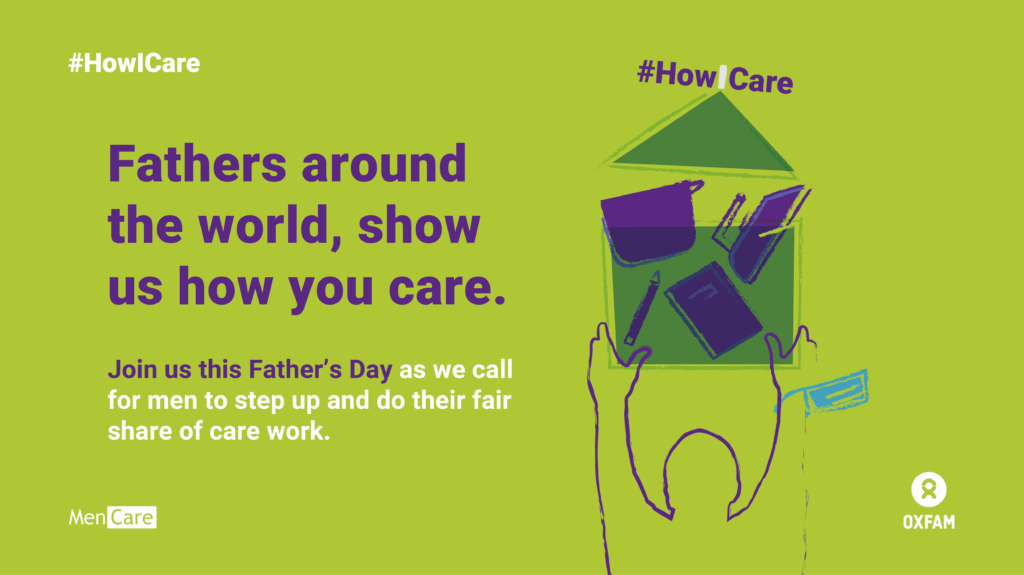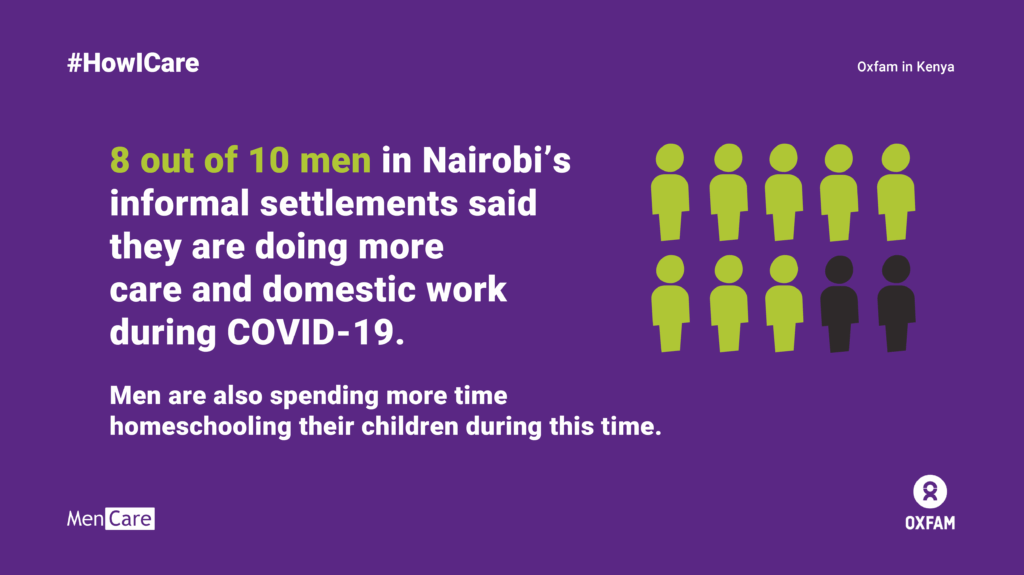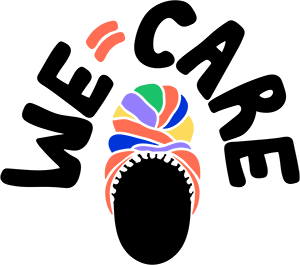#HowICare

Oxfam and Promundo delivered the high-profile global campaign #HowICare in the run up to Father’s Day 2020. This data-informed campaign aimed to shed a light on the realities, difficulties, and disparities of providing care, specifically caring for children, to advocate for additional support for caregivers during the COVID-19 pandemic and beyond. Through the campaign, we encouraged men as individuals, employers, and advocates in ensuring that care is a collective responsibility: shared equally and supported by structures and policies.
Our process
The partnership between Oxfam America and Promundo spurred the discussion on delivering a momentous campaign on Father’s Day that tackle the realities of COVID-19. As the pandemic paints a more vivid picture of the unequal care responsibilities that fall on women and girls, WE-Care saw this campaign as an opportunity to send our key influencing messages across to relevant sectors, such as governments, businesses, and men.
Across the multi-country WE-Care programme—Ethiopia, Kenya, Uganda, Zimbabwe, and the Philippines—including the regional Pan-Africa and global components, the #HowICare planning started in May, following the meeting hosted by Promundo to discuss the campaign’s vision, objectives, and tactics. Together with our communications colleagues and partners, we developed our campaign agenda around care-related services and the need to challenge existing social norms that disadvantage women and girls, and where men play critical roles. The global team led on developing a social media content calendar, which carried our key influencing asks. Localizing these asks, our country teams then drew up relevant messages that reflected the voice of the communities we work with. The campaign run from June 18 to 21, 2020.

Our asks
Globally, we know that women carry out three times the amount of household and childcare that men do. Our experience shows that in low-income settings, the unpaid care and domestic work (UCDW) women do increases, especially in times of disaster or crisis. We believe this must change.
Through this campaign, WE-Care called for a radical shift in who does the care work at home—with men taking on an equal share—and in how governments, businesses, and other institutions support the carers within our communities. In our focused programme messaging, we called for:
- Governments to increase access to affordable household water to reduce women and girls’ heavy and time-consuming unpaid care work. Evidence from low-income contexts shows that access to household water can reduce women’s time on UCDW by up to four hours a day, giving them more time to take part in activities they choose, including paid work and education.
- Governments to invest in quality and affordable childcare for all, particularly for low-income workers. Access to quality and affordable childcare in low-income settings is already a challenge that is made worse by COVID-19. Government investment in affordable childcare is essential to our economies and our societies.
- Governments and employers to offer equal, fully paid, non-transferable parental leave for all parents, as a supplement to maternity leave, not an alternative; and family leave for all. Parental leave is crucial for all parents to provide care for their children; and we need all parents, including men, to take it. Policies like parental leave, and shifts in norms are needed to support women, men, and all caregivers in having access to, and taking their full leave.
- Men to step up and do their fair share of care work—challenging the idea that care work is ‘women’s work’. Men need to step up to equally fulfill their responsibilities on care work to address the disproportionate amount of care done by women within households and communities.
Our tactics
In the week-long #HowICare campaign, WE-Care country teams and partners used a variety of tactics on different platforms to send our messages across. We saw critical engagements from different sectors—from social media (primarily on Facebook and Twitter) to traditional media platforms, such as television, radio, and print. Here are some highlights:
- Social media. Primarily on Facebook and Twitter, we called for fathers around the world to show us how they care, especially during the COVID-19 pandemic. Our strategy involved engaging men to show support on our campaign calls through stories that celebrate fathers who stepped up in taking care responsibilities at home. Not to miss the moment, we also tied our UCDW messages to create awareness on systemic barriers that hinder gender equality, such as the absence of care-related services and infrastructure, gender-based violence, and negative social norms.
- Highlight: We engaged social media influencers in Kenya and Zimbabwe, employed a gamification strategy through a Facebook promotion called ‘Lodi Kong Tatay’ (My Idol Father) in the Philippines, and showcased inspiring stories of families in Ethiopia and Uganda.
- Radio. Recognizing the power of radio to reach low-income and rural communities, our country teams and partners in Uganda and Zimbabwe joined radio talk shows to call on men to share care work at home. The radio discussions reinforced the need for care-related infrastructure to ease women’s workload.
- Television. In Kenya, during a primetime event ‘Nation Leadership Forum’ aired in the week of the campaign, we shared the fact that more men are now doing care work during the pandemic. In Zimbabwe, meanwhile, we joined a televised panel discussion to talk about the campaign and our key asks, where Oxfam, our partner Padare, and the Director of Gender in the Ministry of Women’s Affairs exchanged meaningful insights on challenging harmful social norms in the country.
- Print. In the Philippines, we published articles and an opinion piece on care work on national news outlets, which potentially reached more than 16 million people.
- Research. Kenya and the Philippines also beefed up the global Oxfam report on care work with interesting findings from their rapid gender assessments, showing among others that while men reported increase in hour spent on care work, women and girls still do more.
Our reach
Combining the social media and traditional media figures for our campaign, we reached more than 25 million people with UCDW-related messages. The campaign showed that sharing positive experiences of men engaged in care work evoked discussions. In the Philippines, for instance, this led to positive and better engagement, as we received a total of 120 entries in our Facebook promo.
While the campaign revealed that many men have embraced care work and are enjoying it, resistance from some men was apparent, as they believed care work should be a woman’s responsibility. In Uganda, for example, there were instances where those who are already engaged in care work perceived it as helping women and girls rather than sharing the responsibility.
In all of these platforms, we saw the need to sustain the discussion, which is key to shift negative social norms. Our experience tells us that people’s attitudes toward care work are changing through continuous influencing initiatives on UCDW. In Uganda, there was a notable improvement on male involvement in this campaign compared to another social norms campaign delivered in 2018. Many male respondents for instance came out in support of even distribution of unpaid care work, which was not the case with the last campaign. In the Philippines, the #HowICare campaign also had higher engagement rate than the previously held campaign called #iLabaYu, which also influenced men to share care work at home.
